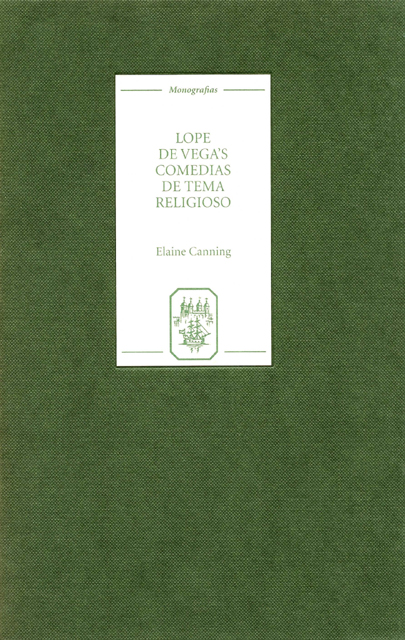4 - Lo Fingido Verdadero as Metaplay
Published online by Cambridge University Press: 04 May 2023
Summary
Lo fingido verdadero, described by Menéndez y Pelayo as ‘de las más notables del repertorio religioso de Lope’, was probably written about 1608, but first appeared in print in Decimasexta parte de las comedias in 1621. Traditionally categorised as a comedia de santos, it is essentially a dramatisation of the conversion and martyrdom of St Genesius, patron saint of actors, as well as the representation of the rise to power of the Roman emperor Diocletian. Act I of the play presents Diocleciano’s transition from soldier to emperor following the deaths of the emperor Aurelio and his sons Carino and Numeriano. It opens with the complaints of the soldiers Maximiano, Marcio, Diocleciano and Curio concerning their campaign against the Persians and lack of food, together with their condemnation of Aurelio and Carino and an appraisal of the qualities of Numeriano, soldier and second son of the emperor. This is followed by Diocleciano’s criticism of Aurelio, though later he repents and urges respect for his role as emperor. With the appearance of Camila, the labradora and breadseller, Diocleciano requests some bread and lightheartedly promises to repay her when he becomes emperor of Rome. Camila teasingly predicts that he will become emperor when he kills a jabalí, or wild boar.
Following Camila’s prophecy, the emperors Aurelio and Carino are introduced into the dramatic action. Firstly, the arrogant Aurelio utters a lengthy monologue in which he asserts his authority and challenges the Roman god Jupiter, only to be struck down and killed by lightning. Subsequently, Carino is presented on his nightly mission in Rome in search of adventure accompanied by his criado, amante and músicos. After a discussion with Ginés regarding theatre in general and a play about himself which he would like Ginés to present, Carino is killed by Lelio, a consul whose wife has been seduced by the libertine ruler.
At this point, the Roman soldiers are presented for a second time, now in the company of Apro, father-in-law of Numeriano. The discovery by the soldiers that Apro has killed his son-in-law in order to gain personal control of the empire results in the murder of Apro, the metaphorical jabalí, by Diocleciano. With the fulfilment of Camila’s prediction, Act I ends with Diocleciano’s instructions to the army to return to Rome.
- Type
- Chapter
- Information
- Publisher: Boydell & BrewerPrint publication year: 2004

